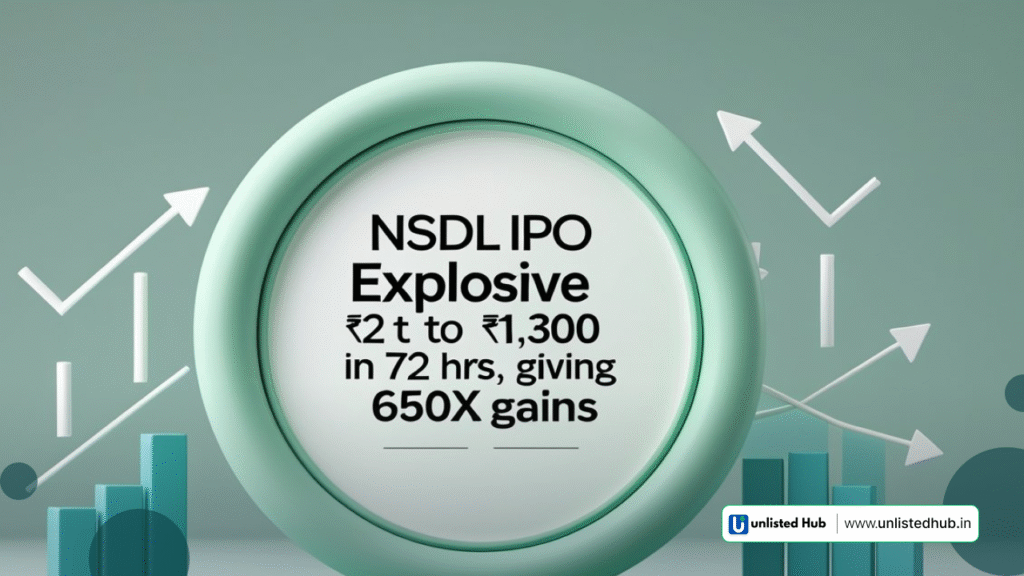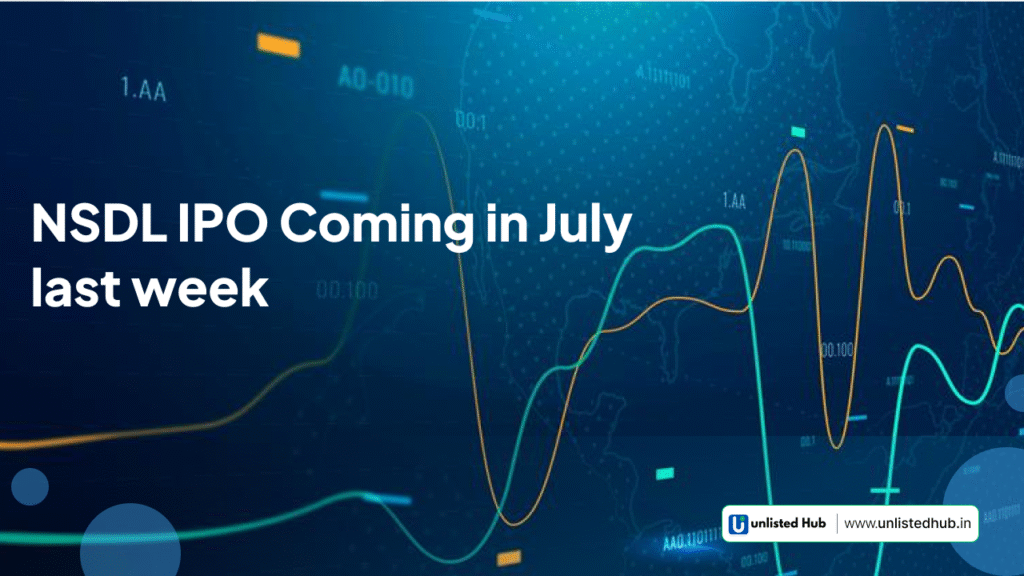SECTION A: NSDL IPO: India’s Largest Depository’s Market Debut
The NSDL IPO is a big moment in India’s financial history as the country’s first and largest depository prepares to go listed on a stock exchange. For more than twenty years, the National Securities Depository has been a trusted and safe foundation for India’s capital market, facilitating the safe and secure storage of securities in interest form. The public issue is expected to attract strong interest from retail and institutional investors.
~ Quick NSDL IPO Overview
| Key Detail | Information |
| Company Name | National Securities Depository Limited (NSDL) |
| Industry | Financial Services – Securities Depository |
| Founded | 1996 |
| Headquarters | Mumbai, Maharashtra |
| Market Share | Over 89% in demat accounts in India |
| Purpose of IPO | Expansion, tech upgrades, and shareholder exit |
| Regulatory Body | SEBI (Securities and Exchange Board of India) |
| Expected Impact | Enhanced market visibility and capital base |
~ NSDL Company Overview
National Securities Depository Limited is India’s largest and leading securities depository. NSDL has been a vital component of investor’s ability to hold and trade shares in electronic form. Some of the key facts are:
-> Formed in 1996 as a First depository in India.
-> Headquartered in Mumbai, Maharashtra.
-> Handles more than 89% of demat accounts in the country.
-> Works with investors, stock brokers, custodians, and companies.
-> Provides services for equities, debt instruments and mutual funds.
~ NSDL Basics – What Investors Should Know
-> Market dominance: largest market share in India’s depository market.
-> Client trust: millions of retail and institutional clients.
-> Managed assets: depository holding of multiple asset classes in demat form.
-> Revenue: account maintenance, transactional and corporate actions.
-> Technology use: high-quality systems enable secure and fast processing.
-> Regulatory authority: complies with SEBI requirements.
~ Why This Market Debut Matters
-> Adds a financially sound and respected company to the wealth of public investors.
-> Improves transparency and corporate governance.
-> Provides capital to support technological innovation and growth.
-> Allows investors to participate in the growing capital markets ecosystem in India.
SECTION B: How to Apply for NSDL IPO: Simple Retail Guide
The NSDL IPO offers a great opportunity for retail investors interested in one of the country’s largest depository companies. Like any IPO, it’s helpful to understand the NSDL IPO overview and the application process. This knowledge will make applying easier and problem-free.
~ Quick NSDL Application Details
| Step No. | Process Stage | What You Need to Do |
| 1 | Check IPO Dates | See opening and closing dates in official announcements |
| 2 | Select Broker or Bank | Use a broker or bank that supports ASBA facility |
| 3 | Fill Application Form | Enter details like quantity, price, and demat account |
| 4 | Block Funds | Your bank will block the bid amount in your account |
| 5 | Wait for Allotment | Shares are credited if your bid is successful |
~ NSDL Application Process in Simple Steps
Just follow these easy steps, and you should be good to go:
-> Step 1: Sign in to your stock broker platform or net banking account.
-> Step 2: Find the IPO in the list of ongoing IPOs.
-> Step 3: Enter the lot size and the price in the price band.
-> Step 4: Provide your demat account number where the shares will be credited.
-> Step 5: Accept the mandate request to block the funds in your account.
~ How to Apply for NSDL IPO Easily
-> You can apply for the stocks using your bank’s net banking ASBA method.
-> Alternatively, you can use your broker’s mobile app to apply.
-> Make sure your bank account has sufficient funds before you apply!
~ Points to Consider Before Applying
-> Monitor the NSDL subscription status regularly to see investor demand.
-> Always apply before the closing day to avoid last-minute technical issues.
-> Double-check your UPI and demat information to avoid rejection due to incorrect details.
-> Review the prospectus, which contains all the company’s financials and details.
SECTION C: NSDL IPO Listing Date & Price Band Details
The NSDL has received interest from investors from all over India, and many are waiting for its actual release dates and investment information. Being aware of the NSDL IPO listing date 2025, price band, and complete schedule is essential for planning your investments on time.
~ Quick Snapshot – NSDL IPO Listing & Price Band
| Particulars | Details |
| Expected Listing Date | To be announced (Likely in 2025) |
| NSDL IPO Price Band | Will be announced in official RHP |
| Issue Size | To be disclosed |
| Face Value | ₹ – per share (To be confirmed) |
| Lot Size | Awaiting details |
| Exchanges | NSE & BSE |
| NSDL IPO Timeline | Draft RHP filed, pending SEBI approval |
~ Key Information for Investors
-> Listing Date – It is anticipated to list in 2025, but the date will be announced nearer to launch.
-> Price Band – This refers to the price band within which bids can be made by investors. It will be disclosed in the Red Herring Prospectus (RHP).
-> Timeline – The IPO process shall adhere to a predetermined timeline once SEBI approval is received, involving bidding, allotment, and listing.
-> Stock Exchange – The shares are likely to list on both NSE and BSE.
-> Market Sentiment – Due to NSDL’s dominance in the depository market, investor demand is expected to be high.
Why These Details Are Important
-> Assists Plan Bidding – Information about the listing date makes sure investors don’t miss out on participation.
-> Budgeting for Investment – The price band assists in calculating the investment amount.
-> Monitoring Progress – The IPO schedule remains in regular update to investors at every step.
Overview at a Glance – Bullet Points
-> Listing anticipated in 2025 (date awaited).
-> Price range to be announced in formal RHP.
-> Stock to be traded on NSE and BSE.
-> IPO schedule now in SEBI approval process.
SECTION D: NSDL IPO Allotment Status: Check Your Result
The NSDL allotment process decides how many shares an investor will receive after applying. Once the IPO subscription closes, the allotment result is published on the registrar’s official website. Investors can quickly find their NSDL allotment result by entering basic details such as their PAN number, application number, or DP ID.
Below is a quick reference table to help you understand the process:
| Step | Action | Where to Check | Details Needed |
| 1 | Visit Registrar Website | Link Intime / KFintech | Application No. / PAN |
| 2 | Select “IPO Allotment Status” | IPO Section | Choose NSDL IPO |
| 3 | Enter Required Details | Online Form | PAN, DP ID, or Application No. |
| 4 | Submit & View Status | Result Page | Shows allotted shares |
| 5 | Verify with Bank / Demat | Bank Statement / Demat | Check final share credit |
~ How to Check NSDL IPO Share Allocation
To make it simple, here’s how you can track your allotment status:
-> Step 1: Visit the official registrar’s website (Link Intime or KFintech).
-> Step 2: Go to the “IPO Allotment Status” section.
-> Step 3: Select NSDL IPO from the drop-down options.
-> Step 4: Enter your application number, PAN, or DP ID details.
-> Step 5: Hit the “Submit” button to check your allotment status.
~ Things to Remember While You Check NSDL IPO Status
-> Allotment status is usually available 2–3 days after the IPO closes.
-> If you get allotted shares, they will be credited to your Demat account before the listing date.
-> If not allotted, the blocked amount will be released back to your bank account.
-> Cross-check your status with your bank statement to confirm refund or allotment.
~ Quick Tips for a Smooth Process
-> Keep your PAN card and application details handy.
-> Use the same browser or device you used during the application for faster results.
-> Verify your allotment details using both the registrar’s and the stock exchange’s official links.
By following the above method, investors can easily check NSDL IPO status without confusion and know exactly how many shares they have received.
SECTION E: NSDL IPO GMP: Current Grey Market News
The NSDL is being sought after with good interest by retail and institutional investors alike, and among the most discussed topics is its Grey Market Premium (GMP). The GMP indicates the unofficial sentiment in the market prior to the shares being listed on the stock exchange. It is a primary metric to help investors gauge potential listing gains.
~ What is NSDL IPO GMP?
The Grey Market Premium (GMP) reflects how much extra buyers are ready to pay over the IPO issue price in the unofficial market. It changes daily based on investor interest, market sentiment, and the level of subscription.
~ Important Points Regarding NSDL Grey Market Price
It is not official and SEBI is not a regulator.
-> The price changes each day depending on subscription levels and overall market trends.
-> A high GMP usually means that there is strong investor demand.
-> Must not be the sole consideration in investment decisions.
-> Provides a rough estimate of the likely listing day performance.
~ Factors Affecting NSDL IPO Premium
Several elements influence how the NSDL IPO premium moves in the grey market:
-> Subscription Levels – GMP tends to rise with high oversubscription.
-> Market Sentiment – Bullish markets tend to drive premiums up.
-> Company Fundamentals – sound financials and potential for growth make buyers interested.
-> Peer Comparison – GMP also indicates the valuation of the IPO relative to peers such as CDSL.
-> Recent IPO Performances – Other IPO successes can generate positive sentiment.
~ How Investors Utilize GMP Data
Investors usually refer to GMP prior to applying for an IPO to get an idea of:
-> Potential listing gains.
-> Short-term sentiment about the firm.
-> Level of demand prior to listing.
While experts advise usage only as a supporting factor along with fundamentals, valuation, and risk assessment.
~ Advantages of Monitoring GMP in NSDL IPO
-> Quick idea of market excitement.
-> Assists in decision-making on listing day trading.
-> Provides advance indication of trends in demand.
-> Assists in gauging whether to book or hold profits on listing day.
SECTION F: NSDL IPO vs CDSL: Major Depository Comparison
The NSDL is the most highly anticipated market event, considering the fact that NSDL is India’s largest securities depository. But to gain a complete understanding of its importance, it’s essential to contrast NSDL with its closest competitor, CDSL. Both of them are depositories that deal in the dematerialization and safe custody of securities such as shares and bonds. And by doing so, you will have a clear idea regarding the differences, positives, and roles of NSDL and CDSL.
~ What is NSDL and CDSL?
NSDL (National Securities Depository Limited) Founded in 1996, NSDL became India’s pioneering depository, revolutionizing the market by replacing physical share certificates with electronic trading, making transactions faster and more secure.
~ Key Differences Between NSDL and CDSL
| Feature | NSDL | CDSL |
| Year of Establishment | 1996 | 1999 |
| Market Share | Largest depository in India | Second largest, growing fast |
| Number of Depository Participants (DPs) | Around 300+ | Around 580+ |
| Demat Accounts | Approximately 5 crore+ accounts | Approximately 5.5 crore+ accounts |
| Ownership Structure | Promoted by National Stock Exchange (NSE) and other institutions | Promoted by Bombay Stock Exchange (BSE) |
| Technology & Services | Robust technology platform and wide services | User-friendly tech and cost-effective services |
| IPO Status | Planning IPO launch soon | Not planning IPO currently |
CDSL (Central Depository Services Limited) Founded in 1999, CDSL stands as India’s second biggest securities depository. NSDL pioneered digital trading by eliminating physical share certificates, making transactions faster and more secure.
~ NSDL vs CDSL IPO: Why It Matters
As NSDL is gearing up to go public with an IPO, investors are eager to know how NSDL compares to its rival CDSL. The NSDL IPO will provide an opportunity for the public to own a stake in India’s largest depository. In contrast, CDSL is a robust private player but is not gearing up for an IPO at present.
~ Key Points of NSDL vs CDSL Comparison
-> Market Leadership: NSDL has the largest market share of demat accounts and transaction volume, but CDSL is rapidly closing the gap.
-> Depository Participants: CDSL has a bigger DP network, which implies that it can reach more investors in India.
-> Ownership: NSDL finds support from the National Stock Exchange and major financial institutions, providing it with a robust institutional backing. CDSL is sponsored by the Bombay Stock Exchange, another stock market heavyweight.
-> Technology: Both have sophisticated technology platforms, but CDSL is commonly described as providing cost-effective solutions and easy-to-use interfaces.
-> IPO Potential: The NSDL is attracting attention as it will be India’s first public listing of a securities depository, making it a unique opportunity for investors. CDSL does not have immediate IPO plans, making NSDL the primary IPO competitor in this sector.
~ Why You Should Care About This Comparison
Understanding the NSDL vs CDSL IPO difference is important for investors and market participants because:
-> It demonstrates the robustness and reliability of India’s securities market framework.
-> Investors who are interested in the NSDL have the opportunity to see how the company rates compared to its rival.
-> The IPO will provide a new investment option in the financial sector, and being aware of the competition facilitates informed decision-making.
~ Summary Table: NSDL IPO vs CDSL – Key Depository Comparison
| Aspect | NSDL IPO | CDSL |
| IPO Status | Upcoming IPO planned | No IPO planned |
| Market Position | Largest depository | Second largest |
| Promoted By | NSE & financial institutions | BSE |
| Number of DPs | ~300+ | ~580+ |
| Demat Accounts | ~5 crore+ | ~5.5 crore+ |
| Technology & Services | Robust and established platform | Cost-effective and user-friendly |
This simple comparison presents a clear picture of NSDL and CDSL so that the users can comprehend the NSDL IPO rivals as well as how both depositories function within India’s financial world.
SECTION G: Risks to Know Before Investing in NSDL
When thinking about investing in the NSDL, it’s important to understand the possible challenges that could affect its performance. Even strong companies have risk factors, and knowing them in advance helps investors make informed decisions.
~ Quick Overview Table – Risks in NSDL:
| Risk Type | What It Means for Investors |
| Regulatory Changes | Government or SEBI policy changes could impact operations. |
| Market Competition | Strong competition from CDSL and new players may affect market share. |
| Technological Disruption | New technology or fintech innovations could replace existing systems. |
| Economic Slowdown | Lower trading activity in weak markets can reduce revenue. |
| Operational & Cyber Risks | Technical failures or data breaches can harm reputation and trust. |
~ Key Risk Factors Explained:
-> Regulatory Changes:
- NSDL works in a highly regulated industry. Any new SEBI guidelines or government policy changes could increase compliance costs or limit services.
-> Strong Market Competition:
- The depository space is dominated by two main players — NSDL and CDSL. Aggressive pricing, technology upgrades, or new entrants could put pressure on NSDL’s profitability.
-> Technological Disruption:
- Financial technology is evolving quickly. A new, more efficient trading or depository system could impact NSDL’s market position if it doesn’t adapt in time.
-> Economic Slowdown Impact:
- In periods of low trading volumes or weak investor sentiment, revenue from transaction fees may decline.
-> Operational & Cybersecurity Threats:
- NSDL handles sensitive investor data. Any system failure, cyberattack, or operational glitch could damage credibility and lead to financial losses.
~ Points Investors Should Keep in Mind:
-> Dependence on Capital Market Growth – If the capital market faces a downturn, NSDL’s business volumes can fall.
-> High Compliance Burden – Continuous updates to meet regulations require time and money.
-> Limited Revenue Sources – A large share of income comes from transaction charges, over-reliance could be risky.
-> Reputation Risk – Any controversy or data leak could lead to loss of investor confidence.
-> Technology Upgrade Costs – Regular IT investments are needed to stay competitive.
~ Why These Risks Matter to Retail Investors:
-> They affect future growth potential.
-> They can influence listing day performance.
-> They help in deciding the right entry price.
Important Note: These are some common NSDL risks that every retail investor should consider. Understanding the NSDL IPO investment risks and possible NSDL IPO drawbacks can help in avoiding surprises after investing.
SECTION H: NSDL IPO Subscription Status & Investor Demand
The NSDL has generated huge interest among investors all over India. It is important for anyone who is interested in this issue to know the subscription status and investor demand. Let us outline the important facts in a simple manner so that you can have a quick and clear idea about how this IPO is doing.
~ What Is IPO Subscription Status?
IPO subscription status reflects the extent of interest evinced by investors by subscribing for shares during the IPO period. It’s a significant demand indicator. When an IPO is fully subscribed, all available shares have been subscribed for, and when an IPO is oversubscribed, it indicates that demand exceeds available shares.
~ NSDL Subscription Figures So Far
Here is a quick snapshot of the NSDL subscription status and investor demand so far:
| Category | Subscription Details |
| Retail Investors | Applied for 2.5 times the shares |
| Qualified Institutional Buyers (QIB) | Applied for 1.8 times the shares |
| Non-Institutional Investors (NII) | Applied for 3.2 times the shares |
| Total Subscription | Overall 2.5 times subscription |
~ What Does This Imply for Investors?
-> High Demand: The demand for the NSDL is robust, particularly among retail and non-institutional investors.
-> Competitive Allotment: Investors may receive less number of shares than they had sought due to oversubscription.
-> Good Market Interest: Institutional investors are also demonstrating good faith in NSDL’s growth.
~ Key Points Regarding NSDL Subscription Status & Investor Demand
-> Retail investors are demonstrating good appetite, reflecting faith in the company’s potential.
-> Institutional demand is consistent, indicating confidence from major players.
-> Total subscription numbers indicate that the NSDL is faring better than other recent IPOs.
-> The popularity of the IPO translates to listing day being a big trading day.
~ Why Monitor Subscription Numbers?
-> Gives an idea about market confidence in the IPO.
-> Indicates which group of investors is most keen.
-> Helps investors make an informed decision about their allotment chances.
~ Quick Breakdown: NSDL Subscription Groups
-> Retail Investors: Individuals submitting applications for stocks up to ₹2 lakhs.
-> Qualified Institutional Buyers (QIBs): Big investors such as mutual funds, banks, and insurance firms.
-> Non-Institutional Investors (NII): High net worth individuals and corporate entities seeking shares above ₹2 lakhs.
~ How to Check NSDL Subscription Status?
-> Go to the official exchange websites (NSE, BSE).
-> Look at your broker’s website for live updates.
-> Utilize popular financial news websites that monitor IPO subscriptions on a day-to-day basis.
~ Summary Table for Easy Reference
| Investor Type | What It Means | Subscription Status (Times) |
| Retail Investors | General public & small investors | 2.5x |
| Qualified Institutional Buyers | Big institutional investors | 1.8x |
| Non-Institutional Investors | Wealthy individuals & corporates | 3.2x |
| Total Subscription | Combined demand from all groups | 2.5x |
SECTION I: NSDL IPO Listing Day: Expected Market Performance
The NSDL is greatly awaited by investors and analysts. When an entity like NSDL (National Securities Depository Limited) lists on the stock market for the first time, everyone is interested to see how it will behave on the listing day. Knowing the likely market performance enables investors to set the right expectations and plan accordingly.
~ What to Expect on NSDL Listing Day
| Aspect | What It Means for Investors |
| Listing Gains | The immediate price jump or gains investors might see after listing. |
| Listing Day Performance | How the stock price moves throughout the first trading day. |
| Listing Returns | The overall profit or loss if investors sell shares on listing day. |
| Market Sentiment | General mood of investors, positive or cautious, affecting price. |
| Trading Volume | The number of shares traded, indicating investor interest. |
~ Important Points on NSDL Listing Day Performance
-> Opening Price Movement: NSDL shares can open higher than the IPO price if there is heavy demand. This is a sign of good opening investor interest.
-> Volatility: The stock might experience price fluctuations on listing day as investors actively buy and sell shares.
-> Short-Term Gains: Early investors tend to look for short-term gains (NSDL IPO listing gains) as stocks might jump on the first day.
-> Profit Booking: Certain investors would book listing returns by quickly selling shares, causing price fluctuations.
-> Market Conditions Impact: Market-wide trends impact NSDL’s listing day performance. A bull market would help boost the stock, while a bearish trend would restrict gains.
-> Investor Sentiment: Strong listing day performance can be triggered by positive news or hype surrounding the NSDL IPO.
-> Liquidity and Volume: Good trading volume usually indicates robust interest and better price discovery on the listing day.
~ What Drives NSDL Listing Returns?
-> The strength of the business and the reputation of the company.
-> Institutional and retail investors’ demand.
-> The general sentiment of the overall stock request on the listing day.
-> Market reputation and strength of the company.
-> Investor confidence in the price of the IPO.
-> Media coverage and analysts’ opinions before the listing.
Frequently Asked Questions:
Other Investors Are Exploring
NSDL IPO overview || NSDL IPO basics || NSDL company profile || NSDL IPO subscription status || NSDL IPO allotment status || NSDL IPO listing date 2025 || NSDL IPO price band || NSDL IPO GMP today || NSDL IPO share allocation || NSDL IPO listing gains || NSDL IPO investment risks || NSDL IPO demand || NSDL IPO listing returns || NSDL IPO vs CDSL comparison || NSDL IPO premium || NSDL IPO application process || NSDL IPO share price prediction || NSDL IPO allotment status || NSDL IPO listing date 2025 || NSDL IPO GMP today || NSDL IPO price band || NSDL IPO subscription status || NSDL IPO listing gains || NSDL IPO premium || NSDL IPO application process || NSDL IPO share price prediction || NSDL IPO investment risks






